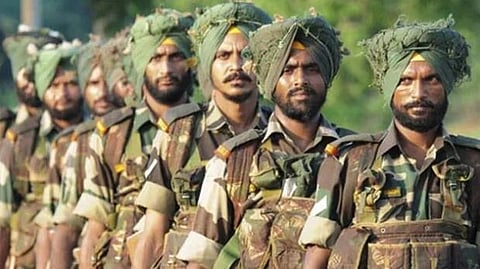

On January 9th, 2023 the Union Defence Ministry as a part of safety gear for the Sikh soldiers in the Indian Army passed an order to procure 12,730 ‘Ballistic Helmets’. These special helmets are made by a company named MKU for Sikh soldiers.
Soon after the details about the order surfaced the biggest Sikh organization in the country SGPC, ‘Shiromani Gurudwara Prabandhak Committee’ tendered their strict opposition against the government’s move, and with this, an age-old controversy has yet again surfaced nearly 100 years later.
Based, on the reports, the Defence Ministry is gearing up to procure 12,730 special helmets for the Sikh soldiers in a fast-track manner, Ministry has issued a tender for this, which includes 8911 large and 3819 extra-large sizes helmets are mentioned.
Veer Helmet: A brief outlook
The first comfortable helmet for Sikh soldiers, ‘Veer’ - MKU, the company that made this helmet, says that the helmet has been made keeping in mind the religious beliefs of the Sikhs. Sikh soldiers can easily wear it over their turban.
Earlier there was no comfortable helmet for Sikh soldiers to wear. Wearing this, the soldiers can also fight the war. It is anti-fungal, anti-allergic, and obviously the much-needed bulletproof.
Apart from this, Veer is equipped with Multi Accessory Connector System i.e. MACS, with this, the location of the jawan can be easily traced in an emergency. This helmet is equipped with head-mounted sensors, a camera, a torch, a communication device, and a night vision device.
A chorus of opposing voices:
“Turbans for Sikhs is not just a piece of cloth it is a crown for them," Giani Harpreet Singh, the Jathedar of Shri Akal Takht Sahab, the holiest site for Sikhs, has termed the helmet decision as an 'attack on Sikh identity'. He has appealed to the Central Government and the Army to withdraw this decision immediately. He said any attempt to replace the turban with a helmet would be seen as an "attempt to suppress the Sikh identity".
SGPC General Secretary Harjeet Grewal has said that providing helmets to Sikhs will end their separate identity. He said that earlier also during the Second World War, Sikh soldiers had refused to wear helmets, so the Center should reconsider the issue.
Denial of wearing a helmet during World War I:
The debate on the use of helmets is not new to the Sikh community. In October 1914, the 15 Ludhiana Sikh Platoon from the British side led the charge to fight against the Germans. During this, the British officials ordered them to wear a helmet. This was the first time that Sikh soldiers refused to wear helmets.
Apart from the British officers, Chief Khalsa Diwan, the central organization of Singh Sabhas of Punjab, also recommended wearing helmets to the Sikh soldiers during that period. However, the Sikh soldiers did not listen to this and fought the war only wearing turbans.
Brigadier Indrajit Singh Gathal says that some other such incidents also happened. However, by then the British Army had passed an order that Sikh soldiers could not be forced to wear helmets.
Despite this, the British were constantly pressurizing the Sikh soldiers to wear helmets. The British had also managed to persuade the leadership of the Shiromani Gurdwara Parbandhak Committee on this issue. Despite this, Sikh soldiers did not wear helmets. After this, the Second World War (1939-1945) was fought by Sikh soldiers with turbans on.
The status of Turban vs Helmet controversy abroad and its history:
Members of the Sikh community are exempted from wearing helmets while driving a two-wheeler in Britain, in view of the commitment of Sikh soldiers to the turban.
In November 1976, the British Queen Elizabeth II gave her royal assent to a bill to exempt the turbaned Sikh community from wearing helmets while riding two-wheelers.
However, there was a long debate on this bill. During this, many aspects including security, the tales of bravery of Sikh soldiers in World War II, the impact of helmets on employment opportunities for Sikhs, and tolerance in British society were talked about.
British Sikh MP Sidney Singh Bidwell played a key role in getting this bill passed. British MP Earl Grey, participating in the debate, said that when World War II was announced, a military order was issued.
It was said in this order that all soldiers of the Indian Army would have to wear steel helmets. On this, the Sikh soldiers said that if they were forced to wear helmets then they would not participate in the war. It was after their protest the order was withdrawn.
Earl Grey said that there are plenty of letters by Commanding Officers praising Sikhs and their turban which has several layers that provide them safety from outer threats.
Colonel Hughes, who commanded the Punjab Regiment in World War II, wrote in one such letter that Sikh soldiers wore turbans in the war. Despite this, however, they suffered fewer head injuries than any other battalion wearing steel helmets.
A US court said in December 2022 that wearing a turban and keeping a beard could not prevent Sikhs from joining the Marine Corps. The court had said this while hearing the petition of 3 Sikh youths. Actually, soldiers are not allowed to keep beards in the Marine Corps. The US Court of Appeals declared the rule of cutting hair and shaving a beard a violation of the Religious Freedom Restoration Act.